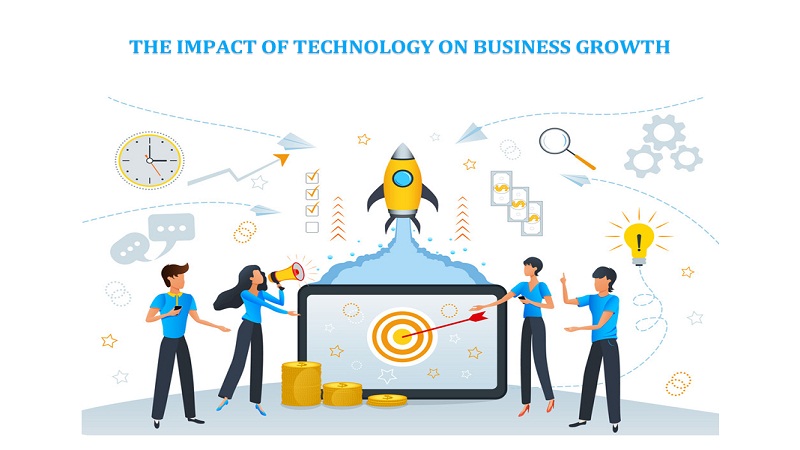
Technology has changed how companies do business, allowing them to know more easily and helping them improve their internal processes and the services they provide.
Digitalization strategies have gained popularity in the past few years due to the benefits businesses have received from treatment.
However, to understand the importance of technology’s impact on business, one can start by looking around and seeing how companies are changing how they do business.

From how they manage their internal teams to how they manufacture and market their products and services through WooCommerce product labels and badges, businesses have undergone major changes in every area, and they are all technology related.
Artificial intelligence, machine learning, and the Internet of Things are just some of the technologies changing how we do business, no matter what business it is. They are, and the change is continuing as we speak.
So, let’s look at some of these important changes that have taken place in companies as we embark on a journey to understand better the impact technology has on businesses.
The Impact of Technology on Business Growth
1. Communication
Business technology helps businesses enhance their communication skill. Email, text messaging, websites, and apps, for example, make it easy to communicate with customers.
Various information technology communication methods allow companies to fill the economical market with messages.
Companies can also get many customer information through these electronic communication channels. Inter-office communication is also improving.
For example, social intranet software provides employees with a central portal to access and update internal documents and contracts and to provide relevant information to other frontline departments.
These methods also help companies reach customers through mobile devices in real-time.
2. Mobile-First Environments
The use of mobile phones has increased tremendously nowadays. In addition, the functions of mobile phones have increased and expanded.
The use of mobile phones and other things supported by mobile devices has helped companies use mobile environments.
Mobile-first environments with smart devices such as smartphones and tablets help professionals conduct business anywhere, anytime.
From marketing through mobile phones to advertising through special events, many business transactions can be carried out using digital devices.
Many activities can run smoothly in a mobile-centric environment, from managing content marketing to selling through online portals.
Mobile-first environments are great for marketing experts because people are happy using mobile devices and tablets. Today it is common to have more than one mobile device.
These devices can be used in different ways with mobile phones and features. More business can be done using mobile phones, from selling and buying to sharing customer information with large audiences.
3. Cloud Computing Technology
Although some business owners are hesitant to use cloud storage, there is no doubt that cloud computing has become the choice of many business owners because of its many benefits.
Better resource management, better efficiency, business efficiency, and low cost. These are a few reasons companies move from on-premise services to the cloud.
And the cloud eliminates the need to buy special equipment. Almost all the applications and services required for running a business are available on cloud computing.
4. Information Security
Most businesses in the digital age are subject to security threats and vandalism.
Technology that can protect financial information, sensitive management decisions, and other sensitive information provides a competitive advantage.
Simply put, technology helps companies stay away from the competition. With computers and passwords in place, a company can ensure that none of its operations are copied by competitors.
Businesses can also use technology to create secure environments for storing sensitive business or customer information.
Many business technology or software types are user-friendly and allow business owners with little tech savvy to get the most out of their tools and features.
5. Effective Marketing
Internet technology has enabled businesses to reach more customers and expand their business.
Since many people use the Internet, this is a great way to spread the word without spending much money.
Many companies have started using social media to promote their business and communicate with customers.
Social media platforms like Facebook, Twitter, and LinkedIn are great for businesses because they allow people to interact with others.
This means that more people will visit your website, increasing the chances of your business selling and promoting.
6. Collaboration and Outsourcing
Business technologies allow companies to sell commercial activities to other businesses domestically and abroad.
Outsourcing can help companies reduce costs and focus on doing their best business functions. Technical support and customer service are two common functions of outsourced companies.
Small business owners may consider outsourcing some operations if they need the proper facilities or workforce. Outsourcing technology allows businesses to outsource functions to the least expensive regions, including foreign countries.
7. Remote Work Technology
Remote work has significant benefits that many have only become aware of in the past two years. With technology, many people can work without going to the office daily.
This change saves time and money and ultimately improves productivity. In addition, you can improve your business by working with experts from all over the world by contacting them digitally.
Now people can work from anywhere and do business. The creation of a remote work environment has changed the way business organizations work and work with their employees.
Employee productivity is enhanced, and business operations run efficiently with advanced applications. In addition, companies can plan business operations at a lower cost because resources are the best in a particular situation.
Conclusion
In conclusion, technology has had a profound effect on business, and countless examples of businesses have been improved or created by technology.
Whether through improved efficiency, communication, or productivity, businesses worldwide are reaping the benefits of technology.
Technology has made it easier for companies to compete in the global market. As technology continues to improve, its impact on business will also increase.
Author Profile
- I am the owner of the blog readree.com. My love for technology began at a young age, and I have been exploring every nook and cranny of it for the past eight years. In that time, I have learned an immense amount about the internet world, technology, Smartphones, Computers, Funny Tricks, and how to use the internet to solve common problems faced by people in their day-to-day lives. Through this blog, I aim to share all that I have learned with my readers so that they can benefit from it too. Connect with me : Sabinbaniya2002@gmail.com
Latest entries
 Artificial IntelligenceJuly 1, 2025How AI and Automation Are Transforming Cloud Server Security
Artificial IntelligenceJuly 1, 2025How AI and Automation Are Transforming Cloud Server Security Digital MarketingJune 28, 2025How to Set Conditional Free Shipping Thresholds in WooCommerce
Digital MarketingJune 28, 2025How to Set Conditional Free Shipping Thresholds in WooCommerce BangaloreJune 27, 2025Does It Snow In South India? Exploring Snowfall Destination
BangaloreJune 27, 2025Does It Snow In South India? Exploring Snowfall Destination Digital MarketingJune 27, 2025WhatsApp Notifications for WooCommerce: Benefits and Tips
Digital MarketingJune 27, 2025WhatsApp Notifications for WooCommerce: Benefits and Tips